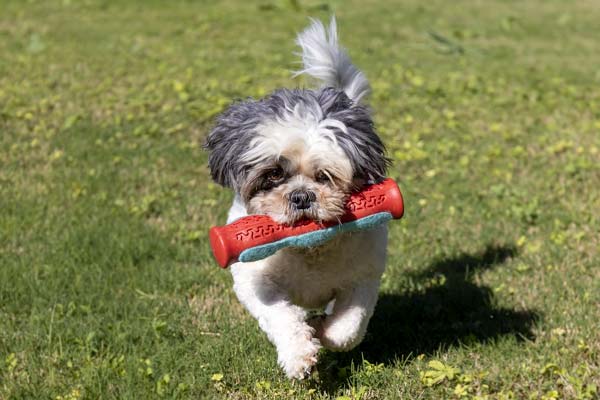Are Shih Tzus Easy to Train? Unraveling the Training Myth

Shih Tzus are adorable little dogs that make great companions. However, when it comes to training, many people wonder if they are easy to train. Shih Tzus can be stubborn and require more patience and effort than other breeds.
While some Shih Tzus may be easier to train than others, as a general rule, they tend to be resistant to training. This stubbornness can make it challenging to teach them basic commands and behaviors. However, with the right approach, training a Shih Tzu is possible.
In this article, we will explore whether or not Shih Tzus are easy to train. We will look at why they can be challenging to train, as well as some tips and tricks for successfully training a Shih Tzu.
Whether you are a new Shih Tzu owner or have had one for years, this article will provide the knowledge and tools you need to train your furry friend effectively.
Are Shih Tzus Easy to Train
Shih Tzus are known for their cute looks, charming personalities, and affectionate nature. However, many owners wonder if Shih Tzus are easy to train. The answer is complex, depending on various factors, including the dog’s personality, the owner’s training approach, and age.
Shih Tzus tend to be stubborn and independent, which can challenge training. They are also sensitive and can become easily overwhelmed or anxious if pushed too hard. However, Shih Tzus can be trained effectively with patience, consistency, and positive reinforcement.
Starting early is one of the most critical factors in training a Shih Tzu. Puppies are more receptive to learning and can quickly pick up basic commands and behaviors. Consistency is also crucial, as Shih Tzus needs clear and concise instructions to understand their expectations.
It is also essential to keep training sessions short and fun. Shih Tzus have a short attention span and can become easily bored or distracted. Breaking training into short, enjoyable sessions can help keep the dog engaged and interested.
Factors Affecting Training Ease
Training a Shih Tzu can be challenging, and it is crucial to understand the factors that can affect the ease of training. Here are some sub-sections that can help you understand these factors:
Intelligence, Willingness to Learn, and Trainability
Shih Tzus are intelligent dogs, but they can sometimes be stubborn, making them less willing to learn. Their trainability depends on various factors such as their age, temperament, and personality. Some Shih Tzu puppies may be easier to train than others, but they generally require consistent and patient training.
Breed-Specific Challenges and Housebreaking Difficulties
Shih Tzus have a few breed-specific challenges that can make training them difficult. For instance, they have a small bladder and must go outside frequently.
Additionally, they are prone to separation anxiety, making housebreaking difficult. It is essential to be patient and consistent with housebreaking your Shih Tzu.
The Role of Socialization and Early Training
Socializing your Shih Tzu from an early age can make training easier. Shih Tzus are social dogs and enjoy being around people and other animals.
Early training can help your Shih Tzu develop good behavior and manners. It is essential to start training your Shih Tzu early to avoid any bad habits from forming.
Tips for Training a Shih Tzu
Training a Shih Tzu can be a challenging task, but it is not impossible. The right techniques and approach can be a rewarding experience for the pet and owner. Here are some tips for training a Shih Tzu:
Positive Reinforcement Techniques
Reward-based training, which involves praising and rewarding the dog for good behavior, is an excellent way to motivate them to learn. Use treats, praise, and toys to reward good behavior and avoid punishment-based training.
Patience and Understanding
Patience and understanding are essential when training a Shih Tzu. They are a stubborn breed that needs time and repetition to learn new commands.
Be patient and avoid getting frustrated when they do not respond immediately. Instead, try to understand their behavior and adjust your training techniques accordingly.
Managing Frustrations
Managing frustrations is crucial when training a Shih Tzu. They are sensitive dogs that can pick up on their owner’s emotions. They will sense it and become anxious if you get frustrated or angry, making training more challenging. Take a break if you feel frustrated, and try again later.
Short and Engaging Training Sessions for Better Results
Short and engaging training sessions are more effective than long and tedious ones. Shih Tzus have a short attention span, so keep training sessions brief and engaging. Make training fun and interactive by using toys and treats to motivate them.
Addressing Training Challenges
Training a Shih Tzu can be challenging due to its stubborn nature. However, it is possible to train them effectively with patience and consistency. Here are some common training challenges and effective solutions to overcome them.
Housebreaking Difficulties and Effective Solutions
Shih Tzus can be difficult to housebreak, but it is essential to their training. One effective solution is to establish a consistent routine for feeding, playtime, and potty breaks.
Take your Shih Tzu outside frequently, especially after meals, naps, and playtime. Praise and reward them when they go potty outside.
Another effective solution is to use a crate for housetraining. Shih Tzus are naturally clean dogs and do not like to soil their sleeping area. Use the crate for short periods and gradually increase the time as your Shih Tzu becomes more comfortable. Always supervise your Shih Tzu when they are outside the crate.
Maintaining Focus Amidst Distractions
Shih Tzus can be easily distracted, especially during training sessions. Keep training sessions short and frequent, and gradually increase the duration as your Shih Tzu becomes more focused.
Another effective solution is training your Shih Tzu in a quiet, calm environment. Turn off any distractions, such as TV or radio, and ensure no other pets or people are around.
Dealing with Separation Anxiety
Shih Tzus can be prone to separation anxiety, making training difficult. To alleviate separation anxiety:
- Gradually increase the time you spend away from your Shih Tzu.
- Start with short periods and gradually increase the duration.
- Provide your Shih Tzu with toys and treats to keep them occupied while you are away.
Another effective solution is to create a safe and comfortable space for your Shih Tzu. Use a crate or playpen and provide them with familiar toys and blankets. This will help your Shih Tzu feel secure and comfortable while you are away.
Promoting Independence
Shih Tzus can be clingy and dependent, which can make training challenging. Give your Shih Tzu space to explore and play independently to promote independence. Please provide them with toys and puzzles to keep them occupied and mentally stimulated.
Effective Training Methods for Shih Tzus
Shih Tzus are intelligent dogs that can be trained with the right methods. Here are some effective training methods to help your Shih Tzu learn new behaviors and commands.
Clicker Training for Positive Association
Clicker training is an effective training method for Shih Tzus. This method uses a clicking sound to mark the behavior you want to reinforce.
The clicker is followed by a treat, which reinforces the positive behavior. This creates a positive association between the clicker sound and the treat, making your Shih Tzu eager to perform the behavior that earns the click and treat.
Crate Training for Safety and Comfort
Crate training is an essential aspect of training your Shih Tzu. It provides them with a safe and comfortable space to rest and relax.
It can also be helpful for house training and preventing destructive behavior. To crate train your Shih Tzu, choose a crate that is large enough for them to stand up, turn around, and lie down comfortably.
Introduce your Shih Tzu to the crate gradually, using treats and positive reinforcement to create a positive association with the crate.
Leash Training and Proper Walking Techniques
Leash training is essential for your Shih Tzu’s safety and peace of mind. Start by gradually introducing your Shih Tzu to the leash, allowing them to get used to the feel of it. Use positive reinforcement to encourage your Shih Tzu to walk nicely on the leash. Proper walking techniques include:
- Keeping the leash loose.
- Walking at a consistent pace.
- Using positive reinforcement to reward good behavior.
Using these effective training methods, you can help your Shih Tzu learn new behaviors and commands in a positive and rewarding way. Your Shih Tzu can become a well-behaved and obedient companion with patience and consistency.
Conclusion
In conclusion, training a Shih Tzu requires consistent effort, patience, and positive reinforcement. While training may be challenging, they can learn and adapt well to new situations with the right approach.
It is essential to emphasize the significance of investing in training for potential Shih Tzu owners. Proper training helps strengthen the bond between the owner and their pet and ensures the dog is well-behaved and happy.






